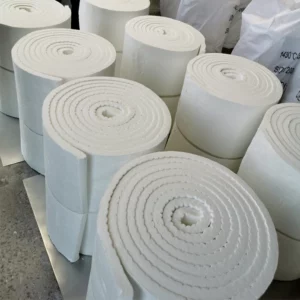Aluminum silicate plates, also known as aluminum silicate ceramic fiber boards, are versatile and high-performance materials widely used in various industrial applications. This article explores the advantages and benefits of aluminum silicate plates, highlighting their exceptional thermal insulation properties, mechanical strength, and resistance to high temperatures.
Understanding Aluminum Silicate Plates
1.Overview of Aluminum Silicate Plates
Aluminum silicate plates are composed of a combination of alumina and silica, resulting in a lightweight and durable material. They are manufactured through a process that involves blending, molding, and firing, resulting in a rigid board-like structure.
2.Features and Properties of Aluminum Silicate Plates
Aluminum silicate plates possess several key properties that make them highly desirable in industrial applications. These include excellent thermal insulation, high mechanical strength, low thermal conductivity, resistance to thermal shock, and chemical stability.
Thermal Insulation Properties
Low Thermal Conductivity
One of the primary advantages of aluminum silicate plates is their low thermal conductivity. This property allows them to effectively reduce heat transfer, making them ideal for insulation applications in high-temperature environments. They help to maintain stable and uniform temperatures, improving energy efficiency and reducing heat loss.
Resistance to High Temperatures
Aluminum silicate plates exhibit exceptional resistance to high temperatures, making them suitable for use in industries such as metallurgy, glass, ceramics, and petrochemicals. They can withstand temperatures up to 1600 degrees Celsius, ensuring long-term thermal insulation performance in extreme heat conditions.
Mechanical Strength and Durability
High Compressive Strength
Aluminum silicate plates possess high compressive strength, allowing them to withstand heavy loads and pressure. This property makes them suitable for applications where structural integrity is crucial, such as in furnace linings, kiln walls, and industrial ovens.
Flexural Strength
The flexural strength of aluminum silicate plates enables them to resist bending and deformation under mechanical stress. This property ensures their durability and longevity in industrial environments, where they may be subjected to vibrations, impacts, or other mechanical forces.
Chemical Stability and Resistance
Corrosion Resistance
Aluminum silicate plates exhibit excellent resistance to chemical corrosion, making them suitable for use in corrosive environments. They can withstand exposure to acids, alkalis, and other corrosive substances, ensuring long-term performance and reliability.
Stability in Harsh Environments
The chemical stability of aluminum silicate plates allows them to maintain their structural integrity and insulation properties even in harsh environments. They are resistant to oxidation, moisture, and most chemicals, making them suitable for a wide range of industrial applications.
Versatility and Applications
Furnace and Kiln Linings
Aluminum silicate plates are commonly used in the lining of furnaces and kilns, providing excellent thermal insulation and heat containment. They help to reduce heat loss, improve energy efficiency, and maintain stable temperatures in high-temperature industrial processes.
Industrial Insulation
In various industrial applications, such as power generation, metallurgy, and petrochemicals, aluminum silicate plates are used for insulation purposes. They effectively reduce heat transfer, minimize energy consumption, and enhance overall process efficiency.
Fire Protection
Due to their exceptional resistance to high temperatures, aluminum silicate plates find applications in fire protection systems. They are used for fireproofing walls, doors, and ceilings, providing a barrier against heat and flames.
Aluminum silicate plates offer a wide range of advantages in industrial applications. Their exceptional thermal insulation properties, mechanical strength, aluminum silicate board resistance to high temperatures, and chemical stability make them indispensable in industries such as metallurgy, glass, ceramics, and petrochemicals. As technology advances, these plates are likely to play an increasingly vital role in enhancing energy efficiency, safety, and performance in high-temperature environments.
